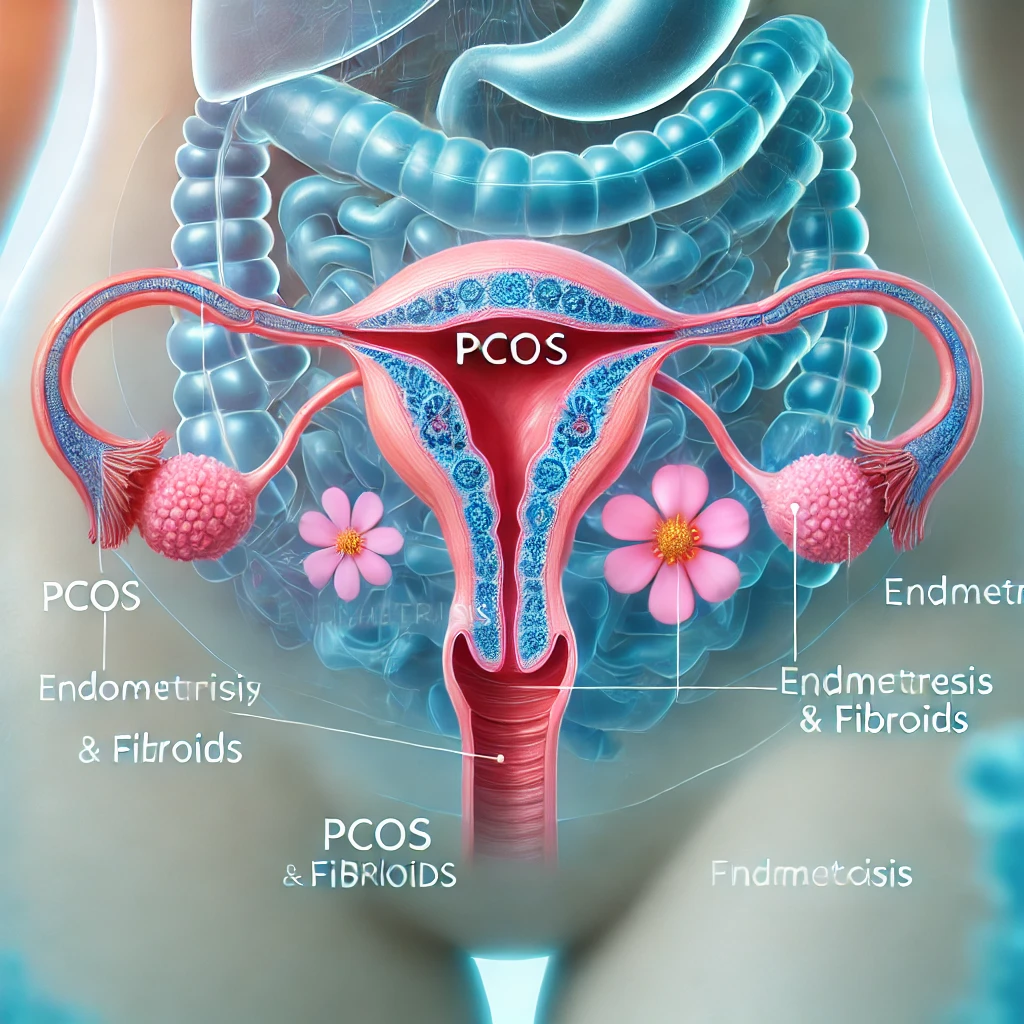
What is PCOS?
PCOS is a hormonal disorder that affects how a woman’s ovaries function. It is characterized by irregular menstrual cycles, excessive androgen (male hormone) levels, and the presence of small cysts on the ovaries.
Symptoms of PCOS
- Irregular or absent periods
- Unwanted hair growth (hirsutism)
- Acne and oily skin
- Weight gain or difficulty losing weight
- Thinning hair or hair loss
- Fertility issues
Causes and Risk Factors
While the exact cause of PCOS is unknown, genetic and environmental factors play a role. Insulin resistance, which affects how the body processes sugar, is also closely linked to PCOS.
Diagnosis and Treatment
Doctors diagnose PCOS using blood tests, ultrasound scans, and a review of symptoms. Treatment includes:
- Lifestyle changes: A balanced diet and regular exercise can help manage symptoms.
- Medications: Birth control pills regulate periods, while metformin improves insulin sensitivity.
- Fertility treatments: Ovulation-stimulating drugs can assist women trying to conceive.
Understanding Endometriosis
What is Endometriosis?
Endometriosis occurs when tissue similar to the uterine lining grows outside the uterus, leading to inflammation, scarring, and pain.
Symptoms of Endometriosis
- Severe menstrual cramps
- Chronic pelvic pain
- Heavy or irregular bleeding
- Pain during intercourse
- Digestive issues (bloating, diarrhea, or constipation)
Causes and Risk Factors
The exact cause is unclear, but factors such as genetics, immune system dysfunction, and hormonal imbalances may contribute to the condition.
Diagnosis and Treatment
Endometriosis is diagnosed through pelvic exams, ultrasounds, and laparoscopy. Treatment options include:
- Pain management: NSAIDs like ibuprofen can help relieve pain.
- Hormonal therapy: Birth control pills, GnRH agonists, and progestins can slow tissue growth.
- Surgery: In severe cases, laparoscopic surgery may be necessary to remove endometrial tissue.
Understanding Uterine Fibroids
What are Fibroids?
Uterine fibroids are noncancerous growths that develop in or on the uterus. They vary in size and may cause mild to severe symptoms.
Symptoms of Fibroids
- Heavy or prolonged periods
- Pelvic pain and pressure
- Frequent urination
- Pain during intercourse
- Lower back pain
Causes and Risk Factors
Fibroids are influenced by estrogen and progesterone. Other risk factors include family history, obesity, and high blood pressure.
Diagnosis and Treatment
Fibroids are diagnosed using ultrasound, MRI, or hysteroscopy. Treatment options include:
- Medications: Hormonal therapy to shrink fibroids.
- Minimally invasive procedures: Uterine artery embolization and MRI-guided ultrasound.
- Surgery: Myomectomy (removing fibroids) or hysterectomy (removing the uterus in severe cases).
Comparing PCOS, Endometriosis, and Fibroids
While these conditions have overlapping symptoms, they have distinct causes and treatment approaches:
- PCOS is primarily a hormonal disorder affecting ovulation.
- Endometriosis involves tissue growing outside the uterus, causing inflammation.
- Fibroids are noncancerous tumors in the uterus, influenced by hormones.
Understanding these differences helps women seek appropriate medical care.
Managing Reproductive Health: Prevention and Lifestyle Tips
- Maintain a healthy diet: A nutrient-rich diet can help balance hormones.
- Exercise regularly: Physical activity supports weight management and hormonal health.
- Manage stress: Yoga, meditation, and therapy can help reduce stress-related symptoms.
- Track menstrual health: Keeping a record of symptoms can help with early diagnosis.
When to See a Doctor
Seek medical advice if you experience:
- Severe pelvic pain or cramps
- Heavy menstrual bleeding
- Difficulty getting pregnant
- Unexplained weight changes
Conclusion
PCOS, endometriosis, and fibroids can significantly impact a woman’s quality of life, but with the right knowledge and medical care, they can be managed effectively. If you suspect you have any of these conditions, consult a healthcare provider for a proper diagnosis and treatment plan.
Do you have experiences with PCOS, endometriosis, or fibroids? Share your story in the comments to help others on their journey!



